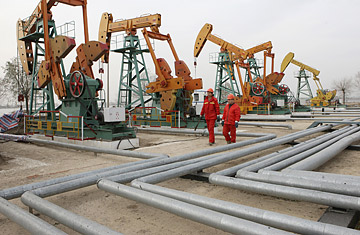
The credit crisis could spark a rise in oil prices
Here's the bad news about the global recession's potentially coming to an end: the recovery could spark a massive energy crisis with increased demand for fossil fuels from China and other developing countries, tighter oil supplies and skyrocketing oil prices. And this is just in the near future. The longer-term picture looks even more daunting. If the world continues to guzzle oil and gas at its present pace, global temperatures will rise by an average of 6°C by 2030, causing "irreparable damage to the planet."
The warning from the International Energy Agency (IEA), an intergovernmental energy watchdog based in Paris, could add extra weight to the negotiations leading up to the climate-change summit in Copenhagen next month, when leaders will attempt to come to an agreement on a successor to the Kyoto Protocol's limits on greenhouse-gas emissions. "Saving the planet cannot wait," reads the agency's annual World Energy Outlook report, which was released on Tuesday. "The time to act has arrived."
But the energy crisis may be even more critical than what the IEA is saying. According to a report in the Guardian on Tuesday, the agency, under pressure from the U.S., has in past reports deliberately underestimated just how fast the world is running out of oil. The newspaper quoted an unnamed senior IEA official as saying that the U.S. encouraged the agency to "underplay the rate of decline from existing oil fields while overplaying the chance of finding new reserves."
The official questioned the prediction in last year's World Energy Outlook that oil production could be raised from the current level of 83 million bbl. a day to 106 million bbl. a day, saying the estimate was higher than is feasible. This year's report lowers that prediction to 105 million bbl. a day. But critics of the IEA have long said the world has passed its peak in oil production and that such levels are unrealistic.
A chief economist for the IEA, Fatih Birol, disputed the Guardian's report. "I don't see any particular encouragement from the U.S. or any other of our governments," he told TIME on Tuesday. He said the accusations about the IEA's downplaying of the world's tightening oil supplies surprised him, since "we have said that oil production is declining in existing fields sharply," he said.
The IEA, which operates under the auspices of the Organization of Economic Cooperation and Development, crunches numbers on energy supplies and demand on behalf of the world's richest countries, including the U.S., the European Union and Japan, which also finance the agency. Birol said the organization's annual report is discussed with all member governments and reviewed by 200 energy experts before being released.
The dire predictions about the world's depleting fossil fuels are in fact known to those closest to the oil wells: oil executives. Yves-Louis Darricarrère, global chief of exploration and production for the French energy giant Total, told TIME last week that the world has "oil reserves of about 40 years at current demands." "It is not so easy to supply the world," Darricarrère said in an interview in south Yemen, where the company just opened a liquefied natural-gas plant. "We will reach a plateau and start to decline." He said that expanding access to alternative-energy options like electric cars and solar panels will only "add some years to the end" of the world's oil reserves.
The IEA report doesn't sugarcoat the future when it comes to climate change, saying the world faces a looming disaster if its leaders drag their feet in Copenhagen. Among the predictions likely to alarm the big energy consumers:
• Unless there is an "energy revolution," the planet will heat up by about 6°C by 2030 — about three times the rate of global warming that is considered manageable by most scientists. That, says the normally sober IEA, "would lead almost certainly to massive climatic change and irreparable damage to the planet."
• The global recession has brought the first significant yearly drop in energy demand since 1981, giving the planet a rare breather from carbon emissions. But this is a "unique" moment, the report says, whose gains will be quickly obliterated without a significant move toward alternative energies. The impending energy crisis is "far greater than many people realize," it says.
• Energy demand will rebound sharply once the recession ends and rise about 40% by 2030. Fossil fuels — oil, coal and gas — will make up about three-quarters of the global increase in energy consumption.
• Coal usage will grow annually about 2.5% from now to 2030, which could lead to massive increases in air pollution.
• Without the energy revolution that the IEA says is necessary, oil prices will rise by 2020 to about $100 a bbl. in pre-2008 dollar values and by 2030 to about $115 a bbl.
To avoid all this, the IEA says the world needs to spend about $10.5 trillion in extra money from 2010 to 2030 to foster new low-carbon energy sources. Expensive, yes. But if the IEA is right, the alternative is far worse.
